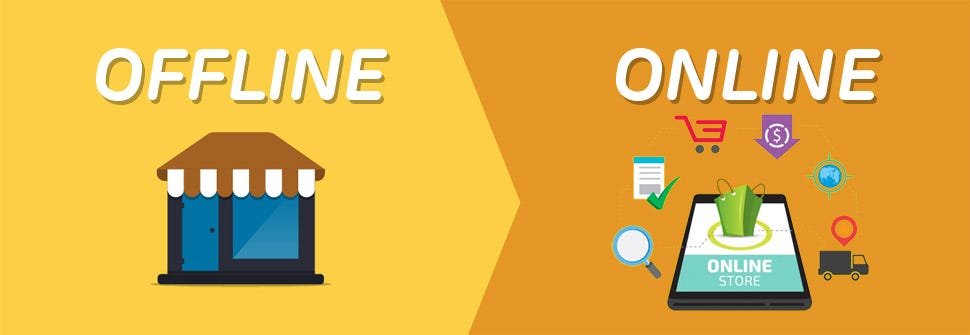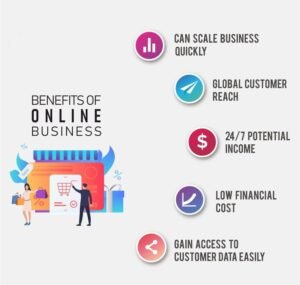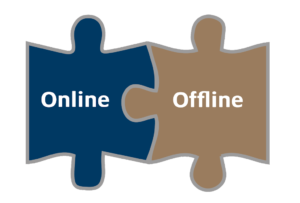Which Business Is Best Online Or Offline In India – Complete Guide For 2023-24
Determining the best and most profitable type of business, whether online or offline, can be subjective and depends on various factors such as market demand, target audience, competition, and resources. Both online and offline businesses have their own advantages and disadvantages, and the decision should be based on careful analysis and evaluation of the specific industry and market conditions. Online businesses offer the advantages of low overhead costs, flexibility, and a potentially wider reach, while offline businesses may have the advantage of local market knowledge and customer loyalty. Ultimately, the success and profitability of a business depend on the execution of a solid business plan and strategies, regardless of the chosen platform.
If you are planning to start a business but have some doubt whether to start selling online or offline, you should know the following data about it:
- The e-commerce market revenue is projected to cross the market of US$ 113.50 billion in 2023.
- The rate at which this revenue will increase during 2023-2027 is expected to 13.96% , making the projected market have a volume of US$ 191.40 billion by 2027.
- The number of users in the Indian e-commerce market is expected to reach the bar of 1,091 million by 2027.
What Is Online Business?
Online business is a type of commercial activity conducted through the internet. It involves selling goods or services through online platforms, such as websites or social media. Online businesses are popular due to their convenience and accessibility to a global audience. They can be operated from anywhere with an internet connection, making them an attractive option for entrepreneurs and small business owners.
Benefits Of Online Business
1. Lower Operational Cost – One of the key benefits of online business is the lower operational costs compared to traditional brick-and-mortar businesses. Online businesses typically do not require physical storefronts, which eliminates expenses such as rent, utilities, and maintenance. Additionally, digital tools and automation can streamline processes and reduce labor costs, allowing online businesses to operate with greater efficiency and profitability.
2. Start Anywhere or No Restrictions On The Location – Another major benefit of online business is the ability to start and operate from anywhere, without restrictions on location. As long as you have an internet connection, you can reach a global audience and conduct business from anywhere in the world. This flexibility allows entrepreneurs to tap into new markets and take advantage of cost savings from operating in lower-cost regions, while still maintaining a strong online presence and customer base.
3. Less Expensive To Establish – Starting an online business is typically less expensive than starting a traditional brick-and-mortar business. The lower cost of entry is due to the fact that online businesses do not require physical storefronts or the associated costs of rent, utilities, and maintenance. Additionally, many online business tools and services are available at low or no cost, allowing entrepreneurs to get started with minimal investment.
4. Always Open – One of the biggest advantages of online business is the ability to operate 24/7, without restrictions on business hours. This allows customers to access products and services at any time, increasing convenience and accessibility. Additionally, online businesses can reach customers in different time zones, expanding their customer base and potential sales.
5. Growth Opportunities – Online business offers numerous growth opportunities, including the ability to scale quickly and reach a global audience. Digital marketing and social media platforms allow businesses to target specific audiences and track performance metrics, making it easier to optimize marketing strategies. Online businesses can also leverage e-commerce tools to automate processes, reduce operational costs, and expand into new markets. With the right strategy and execution, online businesses can achieve significant growth and profitability.
What Is Offline Business
Offline business, also known as a brick-and-mortar business, refers to a type of commercial activity that operates in a physical location, such as a store, office, or restaurant. Unlike online businesses, offline businesses require a physical presence to conduct business and serve customers. This can include expenses such as rent, utilities, and maintenance costs. While offline businesses may face limitations on their geographic reach, they can benefit from face-to-face interactions with customers, which can foster customer loyalty and repeat business. Offline businesses can also benefit from foot traffic and local marketing strategies, such as flyers, billboards, and local partnerships.
Benefits Of Offline Business
1. Make A Loyal and Long-Term Customer Relationship – One of the key benefits of offline business is the ability to build loyal, long-term relationships with customers through face-to-face interactions. Personalized service, trust, and convenience can create a strong bond between businesses and their customers, leading to repeat business and positive word-of-mouth referrals. Offline businesses can also benefit from the community spirit and support that often arises in local neighborhoods and communities, which can further enhance customer loyalty and drive business growth.
2. Customer Can See The Product In Person – Another advantage of offline business is the ability for customers to see and touch products in person. This can be particularly important for customers who want to inspect the quality, size, or fit of a product before making a purchase. Offline businesses can also offer personalized recommendations and advice, enhancing the customer experience and building trust. Additionally, physical stores can create a unique ambiance or atmosphere, which can be an attraction in and of itself for customers.
3. More Trust – Customers tend to have more trust in offline businesses due to the personal interaction and physical presence of the business. The ability to speak with a sales representative or store owner in person can instill confidence in the quality of the product or service. Customers can also see the business’s physical location and have a better understanding of the legitimacy of the business. Building trust is important for creating loyal customers and driving repeat business, and offline businesses have a natural advantage in this regard.
4. Easier to Tap Into local Demand – Offline businesses can benefit from easier access to local demand, particularly if they are located in high-traffic areas or have a strong presence in the community. Local customers may be more likely to visit a physical store than an online business, particularly for services or products that require immediate or in-person attention. Additionally, offline businesses can benefit from local marketing strategies, such as flyers, billboards, and partnerships with other local businesses, which can drive foot traffic and increase brand awareness within the community.
Comparison Between Online And Offline Business
Here’s a more detailed table comparing online and offline businesses:
| Aspect |
Online Business |
Offline Business |
| Presence |
Virtual |
Physical |
| Reach |
Global |
Local |
| Operational Costs |
Lower |
Higher |
| Overhead Costs |
Lower |
Higher |
| Customer Interaction |
Limited |
Face-to-face |
| Trust and Credibility |
May take longer to establish |
Established through personal interaction |
| Customer Convenience |
High |
Lower |
| Product Inspection |
Limited |
In-person |
| Marketing Strategy |
Digital, social media |
Local, flyers, billboards |
| Accessibility |
24/7 |
Limited by business hours |
| Growth Potential |
High |
Limited by physical location |
In summary, both online and offline businesses have their advantages and disadvantages. Choosing the right type of business depends on the specific industry, target market, and business goals. While online businesses have lower operational and overhead costs and can reach a global audience, offline businesses have the advantage of building trust through personal interaction, offering product inspection, and tapping into local demand.
Which Business You Should Start : Online vs Offline: Factors You Need To Consider
Starting a business, whether it is online or offline, requires careful consideration of various factors. Here are some factors to consider:
-
Market demand: Determine if there is a need for your product or service and if there is a sufficient market size.
-
Competition: Research the competition in your industry and identify ways to differentiate your business.
-
Business model: Decide on your business model, pricing strategy, and revenue streams.
-
Target audience: Understand your target audience and their preferences to tailor your product or service to their needs.
-
Budget: Determine your startup costs, ongoing expenses, and projected revenue to ensure financial sustainability.
-
Legal requirements: Understand the legal and regulatory requirements for your business, including permits, licenses, and taxes.
-
Location: Determine if a physical location is necessary for your business or if it can be run entirely online.
-
Skills and experience: Evaluate your own skills and experience to ensure they align with the requirements of your business.
-
Marketing strategy: Develop a marketing strategy to reach your target audience and promote your business.
-
Personal goals: Consider your personal goals, such as work-life balance, income goals, and long-term growth plans, when deciding on the type of business to start.
Conclusion
Choosing between an online or offline business in India depends on the type of business and the target market. For example, if you have a product or service that can be delivered digitally, such as software, e-books, or online courses, an online business may be more feasible. On the other hand, if you have a passion for a physical product or service that requires face-to-face interaction, such as a restaurant or retail store, an offline business may be more appropriate. Ultimately, the decision should be based on careful evaluation of the specific business and personal factors, such as budget, skills, target audience, and legal requirements.
FAQs
Q.1. Which business is more profitable online or offline?
Ans. It depends on the specific business and target market. Both online and offline businesses can be profitable.
Q.2. How is online business better than offline?
Ans. Online businesses can have lower operational costs, a wider reach, and greater flexibility compared to offline businesses.
Q.3. Which offline business is best in India?
Ans. The best offline business in India depends on various factors such as demand, competition, location, and personal goals.
Q.4. Which field is best for online business?
Ans. Some popular fields for online business include e-commerce, digital marketing, online education, software development, and freelance services such as writing or design.

















